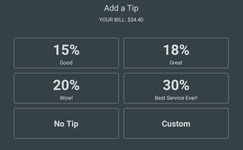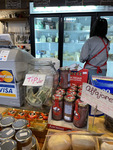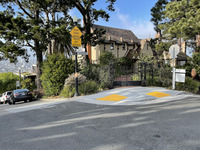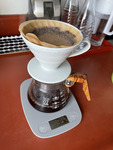 |
| Angelika/Mike Schilli |
|
Michael Do you know what's the most successful newsletter article of all time? It's called "What Germans Do Wrong in America" (Rundbrief 08/2000) and explains the correct tipping etiquette in America. Back then, 21 years ago, I was still upset that German tourists in the US often don't tip enough in restaurants, thus unfairly reducing the wages of the local work force. And to this day, according to Google Analytics, this treatise gets the most hits of the entire site.
Nowadays, the problem has reversed itself, as there are hardly any German tourists anymore, but more and more brazen service businesses in San Francisco are demanding exorbitant amounts of tips. In the traditional tipping establishment, the restaurant, you'll be looked at in disbelief with raised eyebrows if you give the usual amount of 15%, as has been customary for centuries. The waiters, whose service performance has been visibly and steadily decreasing for for years, now want 20%, if not more! Anyone who now shouts "Inflation!" must repeat the percentage mathematics course of their elementary school years, because percentage values do not increase, only the corresponding amounts.
It all started in coffee shops, where "tip jars" are ubiquitous at the checkout. It's customary that cash paying customers, even if they receive no service for "to go" items, have been throwing their change into the jar when they're paying for their coffee latte. This is strange if you think about it. What is this "tip" for? For frothing the milk, pouring the coffee, or ringing up the purchase?
Recently, I entered our new fancy neighborhood fish market around the corner, bought some raw tuna and paid with a credit card, and suddenly a dialogue came up on the terminal, asking if I wanted to give 15, 20 or 25 percent tip. Again: What for? The employee only threw the piece of tuna I pointed to on the scale, typed in the price, wrapped the fish, stuck the label on the packet with the fish and then rang it up at the register. Of course, I entered "no tip", although this seemed cold. But why should the clerk in a trendy fish store earn more than the fish counter man at the supermarket, who does exactly the same type of work?
If you ask around, especially in left-wing strongholds like San Francisco, it turns out that "tip" is nowadays misconstrued as some form of donation for low-wage earners. The millionaire techie thinks, "Oh, the coffee frother at the coffee shop only makes $15 an hour, and I'm filthy rich, so let's throw a dollar in the tip jar, I won't even notice it!" What the generous left lord doesn't consider, however, is that not everyone receives crazy salaries from technology companies shoved up their ass. What if a construction worker wants to treat himself to a coffee, does he then pay with a tenth of his hourly wage for a service that is already included in the purchase price?
It should be noted, though, that fast-food restaurants are the last holdout against this new tipping frenzy. You will never find a tip jar at a McDonald's, Burger King, Wendy's, or In-N-Out Burger. I even read somewhere that the uniforms of McDonald's employees are intentionally made without pockets so that no tips can disappear into them.
The insidious thing about the new behavior is that this "tip" at the credit card terminal often does not go into the pockets of the employees, but is at least partially retained by the operators of the store. So if someone thinks "Okay, I'm rich anyway, I don't care if I pay 20% more" they are signaling to the store that their prices are too low and customers would be happy to pay 20% more. The rich show-off doesn't care if the store then raises the prices, but the clientele who already has to scrimp can then afford even less. So the originally naive-noble intention turns into the opposite: the millionaire socialist drives up prices for everyone, and his protégés in the working class actually suffer from the behavior of their supposed benefactor. The big-headed tip throwers should start thinking about that.
What seems to be completely swept under the rug is what the tip is normally paid for: it is an extra gratuity paid by the guest, to express that they've felt served well at the restaurant. Admittedly, this often requires the waiter to put in some effort, like to quickly ask guests for their wishes when they arrive, perhaps even put on a friendly face, and maybe not chat so engaged with the colleagues behind the counter, getting carried away, and temporarily completely forgetting about their job and the associated tasks, including customers who have been patiently signalling their intention to receive the check for the last ten minutes. A guest that feels exceptionally well cared for will add 20% tip to the bill. In San Francisco, where the typical restaurant bill is around $100, sometimes even $200, this amounts to an extra of $20 of $40 for the waiter per table served, whose base salary is around $20 these days.
What motivation would a waiter have to work a bit harder if the tip was set at a fixed rate of 20% as an added charge to the bill, as some restaurants in San Francisco have already tried? A natural reaction would be to lower the service to the level offered in restaurants in East Germany many years ago. Every restaurant in San Francisco I know that has tried this experiment had to eventually go back to the old system, as customers felt cheated. And rightfully so, it's best to avoid such eccentric places and instead support those restaurants with traditional work ethic.
Another interesting question would be why, for example, a coffee frother in a trendy cafe is rewarded with a tip for their work, while a supermarket cashier is left out of this massive money shower. Wouldn't a supermarket cashier be happy to receive a $15 tip if they checked out a shopping cart with a $100 worth of goods? Or a postman, carrying an Amazon package worth $100, why doesn't he get a $15 tip as a reward? By the way, I worked as a postman many, many years ago and it was not uncommon that someone would slip me a tenner or something. I was always very pleased then, and I didn't interpret it as some form of mandatory levy, but rather as an incentive to next time maybe not crumple the envelope with the glossy calendar into the overflowing mailbox, but instead to ring the doorbell and hand over the valuable piece, despite the loss of time. Money rules the world.
Greetings:
Angelika und Michael















